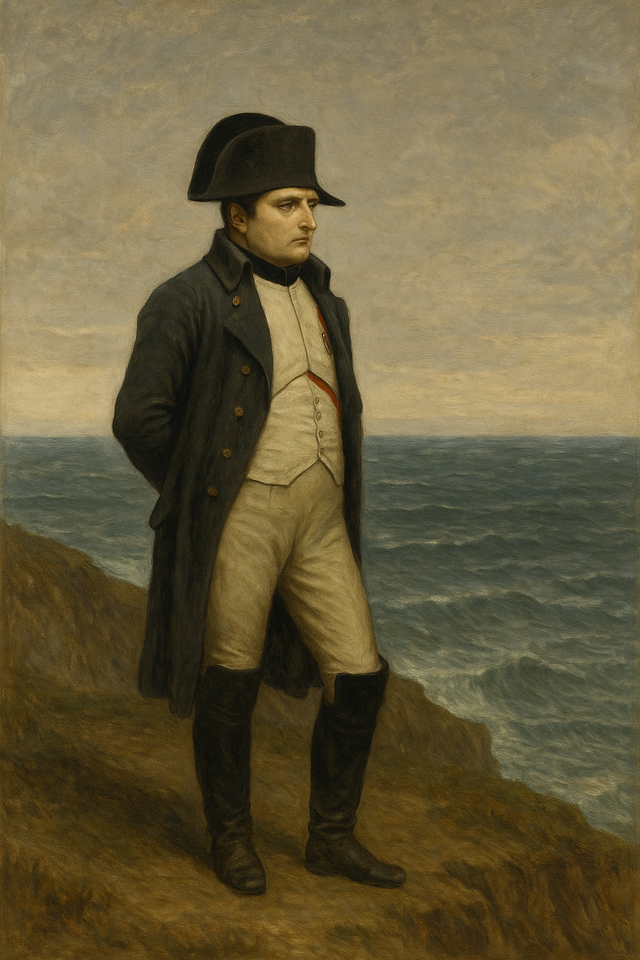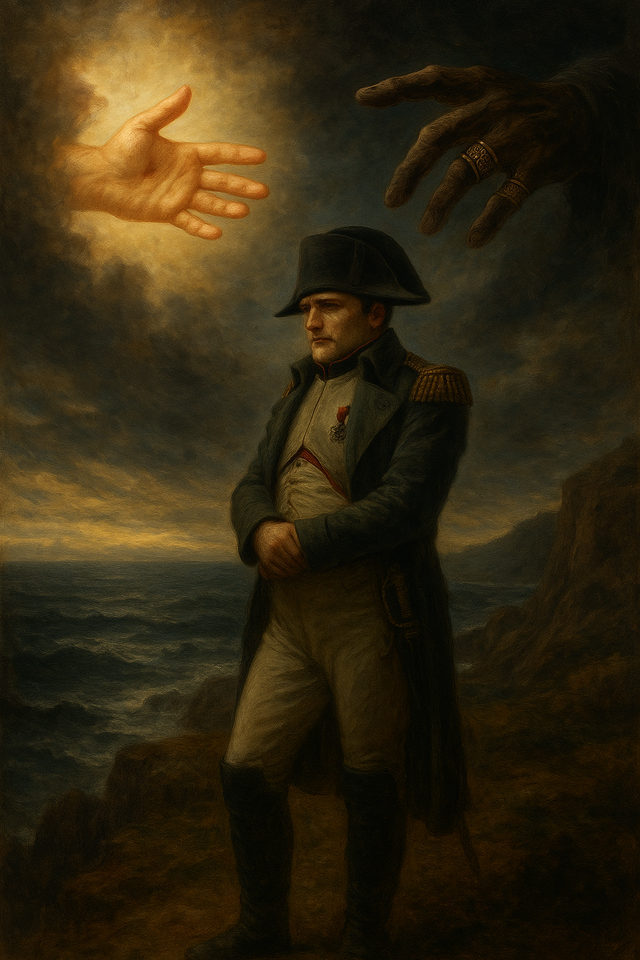This day in History May 5 1821 Napoleon Who Crowned Himself Died
This Day in History – May 5
“The Emperor Who Crowned Himself”
Napoleon’s death in exile, and the lesson of those who rise by ambition, but fall by unseen hands
Once upon a time, in the age when thrones were cracking and altars were burning, a child was born in Corsica—neither fully French nor fully foreign. His name was Napoleon Bonaparte, and the world he entered was breaking apart. The kings of Europe were uneasy, the priests were unsure, and the people were hungry for a new messiah. By the time he was a man, the guillotine had replaced the crucifix in France, and blood cried out from revolutionary streets.1
He was brilliant—no one denies that. A military mind of staggering clarity, a strategist who turned chaos into empire. But more than tactics, he had timing. When the Revolution had devoured its children, the nation turned to him: a man not born of blue blood, but forged by fire and ambition. And so he became the head of the French nation—by sword, by referendum, by necessity.2 He was the insider-outsider: Corsican and Emperor, Catholic and skeptic, hailed as a Christian liberator while keeping close ties with Masonic leaders and secular reformers.3
All around him, the smoke of hidden fires swirled. The Jesuits, long masters of strategy and shadow, whispered still behind pulpits and thrones.4 The Illuminati—though officially disbanded—had already sown their doctrines into Masonic lodges across Europe.5 Brotherhoods met in candlelit chambers, rewriting man in their own image, whispering of reason and light, even as the scaffold creaked beneath their enemies. “Off with their heads,” they cried—liberty by the sword, and peace through blood.6
Into that atmosphere came Napoleon, sword in hand. Was he their pawn? Their product? Perhaps he thought he could steer the whirlwind. Perhaps he believed he was its master. But the longer he reigned, the clearer it became: he was being used, not merely served. No royal house truly embraced him. They allied when needed, then turned when convenient. Russia betrayed.7 Sweden betrayed.8 Even France, at last, turned her face away.
Waterloo should have been won.9 His second return should have succeeded. But something stayed the tide. Something unseen. And so he was exiled again—this time not to Elba, but to Saint Helena, a damp and bitter rock in the Atlantic.10 There he sat in a house painted with arsenic and hung with lead-soaked wallpaper, breathing poison and pondering betrayal.11
Strange, isn’t it, when we crown ourselves emperor? At least he understood what the popes had forgotten: the Vicar of Christ had no authority to crown kings. So he took the crown from the Pope’s hands and placed it on his own head.12 Even Beethoven, who had begun dedicating his Third Symphony to Napoleon, withdrew the honor when he heard. “So, he’s just another tyrant,” Beethoven muttered, and tore the page.13
On May 5, 1821, Napoleon Bonaparte died in exile. He had conquered more of Europe than any man since Charlemagne, yet he died without a throne, without a friend, without a kingdom.14
The Unseen Hands
Two hands were always at work behind the curtain. One—the hand of Satan, ever whispering, ever offering the kingdoms of the world to any who would bow. The other—the hand of God, restraining, permitting, guiding history toward a judgment throne. Napoleon never quite understood which hand shaped his fate. Perhaps neither do we.
But we do know this: “God is not a man, that he should lie; neither the son of man, that he should repent” (Numbers 23:19). All who rise by deceit will fall. All who grasp the crown without grace will taste exile. And all empires—whether crowned by popes or blood—will be broken by the stone cut without hands (Daniel 2:34).
On this day, remember: the true King crowned Himself—not with gold, but with thorns. He did not take the nations by sword, but by sacrifice. And His Kingdom shall have no end.
C’est la vie? No—c’est la vérité.
Napoleon and the Two Unseen Hands
He rose like a comet across the ashes of kings—self-crowned, self-driven, self-deceived.
One hand lifted him with the promise of empire.
Another restrained him with the weight of eternity.
The first whispered, “All these kingdoms will I give thee, if thou wilt bow…”
The second said, “Thou couldest have no power at all against me, except it were given thee from above.”
He knew not whose hand moved him more—only that neither answered to him.
So the Emperor of men stood on the edge of the sea,
Watching a world he could never again command,
While the heavens prepared a judgment he could not outrun.
Epilogue: Napoleon and the King He Could Never Be
In his final exile, the man who had crowned himself Emperor began to see more clearly the throne he would never sit upon. His mind, softened by the slow poison of arsenic and age, turned from strategy to eternity.
“I know men, and I tell you that Jesus Christ is not a man.” So he said, in his own reflection. “Alexander, Caesar, Charlemagne, and I have founded empires. But on what did we rest the creation of our genius? Upon force. Jesus Christ founded His empire upon love; and at this hour millions of men would die for Him.”1
In the end, he knew: all his power was borrowed, all his glory hollow. He could command armies, redraw borders, humble kings—but he could not change hearts. Christ did not reign from a palace but from a cross—and yet His kingdom endures, while Napoleon’s crumbled in his own lifetime.
Napoleon’s last words, they say, were: “France, the army, head of the army, Joséphine...” Words of longing. Words of loss. He died with a vision of power on his lips—but perhaps a hint of regret in his heart.
He could not escape the Unseen Hand.
Neither can we.
1. Reported by General Bertrand in Memoirs of Napoleon at St. Helena, Vol. 2. Though not a verbatim transcript, these reflections are widely attributed to Napoleon by those who knew him in exile.
Footnotes:
- Napoleon was born in Corsica in 1769, just after its annexation by France. The French Revolution (1789–99) executed Louis XVI and launched widespread dechristianization and bloodshed.
- He came to power through the Coup of 18 Brumaire (1799), declared himself First Consul, then Emperor by popular vote in 1804.
- Though raised Catholic, Napoleon used religion pragmatically. He signed the 1801 Concordat with the Pope but surrounded himself with Enlightenment and Masonic-aligned ministers.
- The Jesuits were suppressed in 1773 but operated through informal influence until restored by Pope Pius VII in 1814.
- Abbé Augustin Barruel and John Robison both claimed in the 1790s that the Illuminati had infiltrated Masonic lodges and influenced the French Revolution.
- The Reign of Terror (1793–94) involved mass executions in the name of revolutionary ideals. “Liberty, Equality, Fraternity” was the banner, while thousands died by guillotine.
- Tsar Alexander I of Russia allied with Napoleon before breaking ties and defeating him after the failed 1812 invasion.
- Napoleon's former marshal, Jean-Baptiste Bernadotte, became Crown Prince of Sweden and joined the coalition against him in 1813.
- At Waterloo (1815), Napoleon came close to victory. His delayed start and the late arrival of Prussian troops under Blücher turned the tide against him.
- After Waterloo, he was exiled to Saint Helena in the South Atlantic by the British, where he remained until his death.
- Longwood House, where Napoleon lived in exile, was decorated with green arsenic-laced wallpaper, which may have contributed to his death.
- Napoleon crowned himself emperor in Notre-Dame Cathedral in 1804, taking the crown from Pope Pius VII’s hands and placing it on his own head to symbolize self-derived authority.
- Beethoven initially dedicated his Symphony No. 3 (Eroica) to Napoleon but rescinded it in fury after Napoleon declared himself emperor.
- Napoleon died on May 5, 1821. Official cause: stomach cancer. Alternate theories suggest arsenic poisoning from his environment or deliberate exposure.

